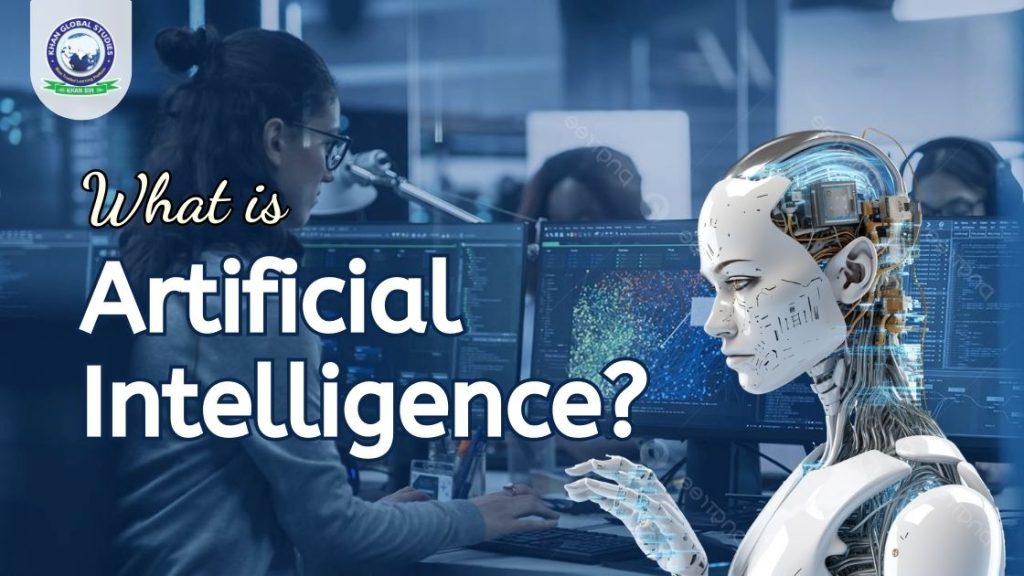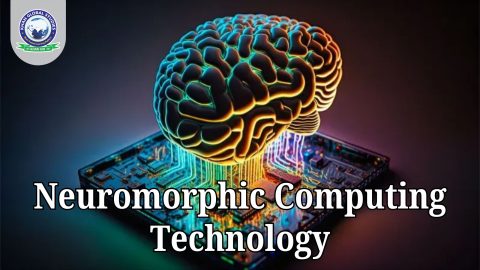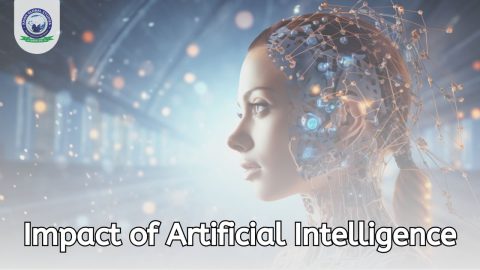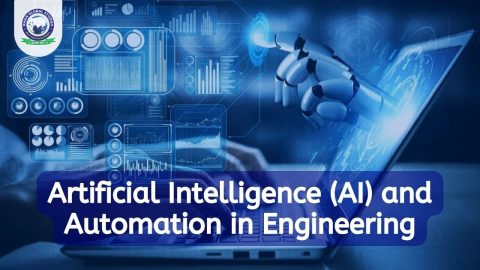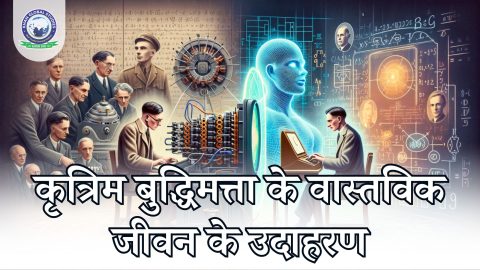In the age of Information Technology, one term has emerged as the driving force behind innovation and change in various fields – Artificial Intelligence (AI), often called the cornerstone of the Fourth Industrial Revolution, is reshaping the landscape of industries, governance and society as a whole. As aspirants of the prestigious UPSC exam, it is essential to understand the deep impact of AI on our world and its implications for the future.
What is Artificial Intelligence (AI)?
Artificial Intelligence is intelligence created artificially to make our lives easier. It tries to mimic human intelligence such as learning and reasoning (using some set of rules to make appropriate or decisive decisions) as well as understanding and correcting mistakes.
Coined by John McCarthy in 1951, AI is considered a broad term that includes automation, robotics, etc. For example, achieving Optical Character Recognition (OCR) was once a distant dream, but with modern advancements and research, it is now a simple technology that everyone uses. PDF to .txt converters and the Google Image Search function are some examples of OCR.
Why Artificial Intelligence?
There are many negative sentiments regarding real-world applications of Artificial Intelligence. Contrary to popular opinion, it cannot fully replace human intelligence in any area. However, a simple task can be made less difficult by automating it. Furthermore, with recent developments, deep learning (AI field) algorithms can predict the future by analyzing past trends and even learning from their mistakes. AI has seen many applications in specific fields that require high accuracy and high work performance.
How does Artificial Intelligence (AI) work?
- AI works by analyzing large quantities of labelled training data to find patterns and correlations.
- It requires specialized hardware and software, with popular programming languages such as Python, R, Java, C++, and Julia often used by developers.
- AI systems may use this data analysis to make predictions about future events or behaviour. For example, a chatbot learns to have lively conversations by studying text examples, and an image recognition tool identifies objects in images by reviewing multiple examples.
- AI programming focuses on cognitive skills such as learning, reasoning, self-improvement, and creativity to achieve specific tasks, such as generating new text, images, music, and ideas.
Types of Artificial Intelligence
Artificial intelligence (AI) is categorized into four types: reactive machines, limited memory, theory of mind, and self-awareness.
Reactive Machines
- The simplest form of artificial intelligence, a purely reactive computer, does not retain memories or prior experiences for use in the present.
- These machines only focus on the current situation and respond in the best way.
- A responsive machine can use its intelligence to understand and react to the world in front of it.
- Since a reactive device lacks memory, it cannot rely on past experiences to inform decision-making in real time.
Limited Memory
- Limited memory types describe the ability of an AI to retain past information and predictions to use that information to update future predictions.
- Machines with a limited amount of memory can only access saved data for a short period and may store some data temporarily.
- Machine learning architectures become a bit more complex when there is limited memory.
- When gathering information and evaluating potential decisions, artificial intelligence with limited memory can store past data and predictions – essentially looking to the past for clues about what might happen next. Artificial intelligence with limited memory is more complex and offers greater possibilities than reactive machines.
Theory of Mind
- Theory of mind is a cutting-edge class of AI technology that exists only in concept. Although this type of AI robot has not yet been created, researchers are working hard to advance its capabilities.
- This form of AI requires a deep understanding of how people and things in the environment can alter emotions and behaviour.
- The principle of Mind AI should be able to socially connect with humans and understand human emotions, people and thoughts.
Self-Awareness
- AI devices will be highly intelligent and have consciousness, emotions, and self-awareness.
- They can detect human emotions and understand their internal characteristics, circumstances and moods. These devices will be more intelligent than the human brain.
- Self-awareness in artificial intelligence is dependent on two critical factors. Some human researchers understand the basis of consciousness and others are learning how to replicate it so that it can be created in machines.
Difference Between AI, Machine Learning and Deep Learning
Machine Learning and Deep Learning are two types of Artificial Intelligence (AI). Machine learning, in essence, is AI that can adapt automatically with minimal human intervention. Deep learning is a type of machine learning that uses artificial neural networks to mimic the human brain’s learning process. Deep Learning is a branch of Machine Learning, which is a branch of Artificial Intelligence.
Artificial Intelligence
Artificial intelligence has become a catch-all term for systems that perform complex tasks that previously required human intervention, such as online customer service or playing chess. The terms “machine learning” and “deep learning” are commonly used interchangeably.
Machine Learning
Machine learning is a branch of computer science that uses computer algorithms and analytics to create predictive models that help solve business challenges. Thanks to machine learning, AI can learn. This is done by using algorithms to discover patterns and derive insights from the data they encounter.
Deep Learning
Deep learning is a subset of the broader machine learning family that simulates human brain-like behaviour using neural networks. Deep learning, a type of machine learning, allows AI to mimic the neural networks of the human brain. It can understand data patterns, noise, and sources of misunderstanding.
Application of Artificial Intelligence (AI)
Applications are found in various industries. Here are some examples:
- Health Care: AI is used to improve patient outcomes and reduce costs by making faster and more accurate medical diagnoses. Virtual health assistants and chatbots help patients locate information and schedule appointments.
- Business: Machine learning algorithms enhance analytics and customer relationship management while providing better customer service. Generative AI technologies like ChatGPT are revolutionizing product design and business models.
- Education: AI automates grading, personalizes learning, and provides extra support to students. AI tools help teachers create course content and engage students in new ways.
- Finance: AI is disrupting the financial industry through personal finance applications and business. IBM Watson is used for home buying and finance management.
- Law: AI automates tasks in the legal industry such as sorting documents and predicting results, saving time and improving services.
- Entertainment and Media: AI is used for targeted advertising, content recommendations, and creating scripts and movies. Automated journalism streamlines media workflow.
- Software Coding and IT Processes: AI tools can generate application code based on natural language signals. AI automates IT processes such as data entry, fraud detection and customer service.
- Security: AI helps with cybersecurity, anomaly detection, and threat analysis to identify and respond to emerging attacks.
- Manufacturing: Robots, including collaborative cobots, have been integrated into the manufacturing workflow.
- Banking: Chatbots help customers and handle transactions, while AI virtual assistants improve compliance and decision-making in banking.
- Transportation: AI operates autonomous vehicles, manages traffic, and predicts flight delays, increasing safety and efficiency.
Use of Artificial Intelligence (AI)
AI exists in various technologies.
- Automation, machine learning, machine vision, natural language processing (NLP), robotics, and self-driving cars are some examples.
- NLP helps computers understand human language, while machine vision allows machines to see and analyze images.
- Robotics deals with the designing and building of robots for various tasks, and self-driving cars use AI for autonomous driving.
- AI also contributes to creating content such as text, image and audio creation, art and email responses.
Advantages of AI
- One of the most significant benefits of artificial intelligence is its ability to reduce human errors while increasing its accuracy and precision significantly.
- AI can work indefinitely without stopping. They can think far faster than humans and perform multiple tasks at the same time with excellent accuracy.
- AI is the driving force behind many breakthroughs that will help humans solve the most complex challenges.
- A major advantage of AI is that it is free from bias, resulting in more accurate decisions.
- This is a major advantage of artificial intelligence. Many harmful limitations faced by individuals can be solved by creating an AI robot that can perform dangerous tasks on our behalf.
Disadvantages of AI
- A fundamental limitation of AI is that it cannot be trained to think beyond the box. AI can learn over time using pre-fed data and prior experiences, but it cannot be fundamental in its approach.
- It is no small feat to create a machine that can mimic human intelligence. This takes a lot of time and effort and can be quite expensive.
- Robots are an example of how artificial intelligence is being used to transform businesses and create unemployment.
- AI software automates most of the difficult and repetitive tasks. This addiction to AI could create problems for future generations.
- Morality and ethics are important human qualities that can be difficult to incorporate into artificial intelligence. The rapid development of AI has raised concerns that it could one day become uncontrollable and eventually wipe out humanity.
Future of AI
- Artificial Intelligence has the potential to change the way we interact with our surroundings. Artificial Intelligence is becoming increasingly common in India, with new technological innovations happening every day that are teaching machines to make decisions on their own in specific situations.
- Artificial Intelligence (AI) is an important discipline of computer science that is set to become a major component of various future technologies such as big data, robots, and IoT. In the following years, it will remain a technological leader.
- Almost any company or sector in India will soon be seen using this powerful tool to complete simple tasks in less time.
- The increasing demand for online courses in Artificial Intelligence in India is due to the recent advancements in the field of AI. Machines that assist people with intelligence exist not only in science fiction movies but also in real life.
Conclusion
Today, AI is one of the most popular technologies due to its applicability in various fields from healthcare to military. Apart from having applications in almost every field, AI is gaining popularity for its scope of making work possible without any human intervention. AI is the key to our future.
FAQ
Question: What is Artificial Intelligence (AI)?
Answer: Artificial intelligence (AI) refers to the development of computer systems that are capable of performing tasks that typically require human intelligence.
Question: Who is the father of Artificial Intelligence?
Answer: John McCarthy is considered the “Father of AI”, having coined the term Artificial Intelligence.
Question: What are the functions of Artificial Intelligence?
Answer: AI functions cover a wide range of applications, including natural language processing, computer vision, machine learning, robotics, automation, virtual assistants, and autonomous systems. Its goal is to enable machines to function intelligently, making human life easier and more efficient.
Question: Why is AI important?
Answer: Artificial intelligence is important because it speeds up, improves accuracy and increases the effectiveness of human efforts.
Question: What exactly is the goal of Artificial Intelligence?
Answer: The basic goal of AI is to enable computers and machines to perform cognitive tasks such as problem-solving, decision-making, perception, and understanding human communication.



